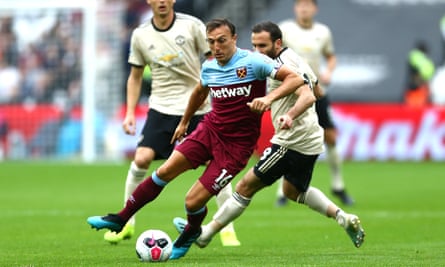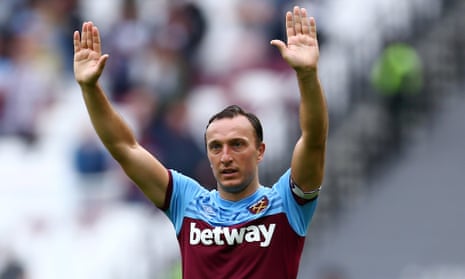‘This is not a bear pit,” one of the Sky pundits said of West Ham’s new home on Sunday. “This is not the old Upton Park.” In geographical, architectural and atmospheric terms, no dispute there. But one man in the claret and blue performed against Manchester United as though he had made his way to work past the market stalls and the Boleyn pub on Green Street and stopped for pie and mash at Nathan’s before taking to the pitch with the hot breath of the crowd on his neck and the anthems of the home supporters shaking the old stands. And that player won the man of the match award.
A couple of minutes before half-time, Mark Noble received the ball from Issa Diop outside the right-hand corner of the United penalty area. He could have played a quick pass down the line into the path of Andriy Yarmolenko. Instead, seeing that the Ukrainian forward was likely to run offside, he paused, feinted to turn and pass inside, turned back the other way before turning full circle, drawing defenders towards him. Then he played the simplest possible square ball to Felipe Anderson, unmarked on his left five yards away. The Brazilian’s instant straight pass found Yarmolenko, running across the face of the goal and squeezing a shot inside the left-hand post.
Noble had spent five seconds on the ball. In that time he had seen and assessed the moving geometry of the 13 outfield players lying ahead of him. He had used a decade and a half of experience as a first-team player, as a leader and a thinker on the pitch. That little pass – so modest, so unostentatious, so right – opened the way to victory for his team. The win was sealed 40 minutes later when he tumbled over Ashley Young’s poorly timed challenge five or six yards outside the area. Aaron Cresswell, having skimmed the bar with a similar effort a few minutes earlier, stepped up to curl the free kick inside the right-hand post. West Ham, who lay 17th in the table at this time last year, are now fifth, under a captain who incarnates a set of values all too easy to ignore but around which any decent team must be constructed.
How their opponents could have done with such a player. Instead they had Juan Mata, a player of similar function, greater gifts and bigger reputation who was able to make no comparable contribution. Wearing washed-out gold shirts, United performed much as we have seen them do over the years in pale grey or faded pink. More than an away-kit rethink, however, they require a player of real character to set the example that keeps the rest of them honest.
Noble is such a player. He is 32 years old, a year older than Mata. He was 13 when he joined the youth scheme of his local club after his father decided that the journey from Beckton to Arsenal’s training ground was too far. The Gunners’ loss was the Hammers’ gain. At 15 Noble became the youngest player to appear in their reserve team. He made his first-team debut at 17 and at 18 he was playing in the Premier League. Since then he has made 470 senior appearances for the club.

If you want to get an idea of his value, look at the list of managers under whom he has served: Alan Pardew, Alan Curbishley, Gianfranco Zola, Avram Grant, Sam Allardyce, Slaven Bilic, David Moyes and Manuel Pellegrini. Consider the variations in approach represented by that parade of contrasting characters, and think what qualities of flexibility and resilience as well as talent must have enabled Noble to survive as a first-choice player under each of them.
He was selected to represent England at every level from under-16 to under-21, sometimes given the captaincy, but has never been awarded a senior cap. In that he evokes the memory of Billy Bonds, another West Ham idol noted for resolve and longevity. Bonds was physically bigger and stronger than Noble, a wing-half converted to central defence, but no more vital a pillar of the side than the younger man. Bonds was picked once for England while Ron Greenwood, formerly of West Ham, was in charge of the national side, but did not make it off the bench.
Quick GuideFollow Guardian sport on social media
Show

Twitter: follow us at @guardian_sport
Facebook: like our football and sport pages
Instagram: our favourite photos, films and stories
There is a line between being a very good player in the league and being an international, and maybe successive managers have been correct in deciding that Noble would not manage to cross it. If Paul Scholes, at his best in a similar inside-forward role, could not be accommodated, then what hope for a player whose creative gifts are not so exquisitely honed? Noble’s lack of ego would probably count against him at the very highest level, just as Ray Wilkins – a first-team captain from the age of 18 – was hobbled as an England player by the altruism that persuaded him to defer to players of lesser talent.
What Noble does – what José Mourinho, finding a charming malapropism to describe Roberto Firmino after another of Sunday’s matches, called “horsework” – is unflashy and sometimes unpretty. Like Scholes, he can endanger his team with tackling that lacks the precision of a true defensive midfielder, and the card he received for a challenge on Aaron Wan-Bissaka with the score at 1-0 might easily have been red. But he stayed on the pitch, helping his team to confound those of us who believed that the move to Stratford under the triumvirate of David Sullivan, David Gold and Karren Brady would be the end of them. Not a player to worship, perhaps, but certainly one to cherish.

